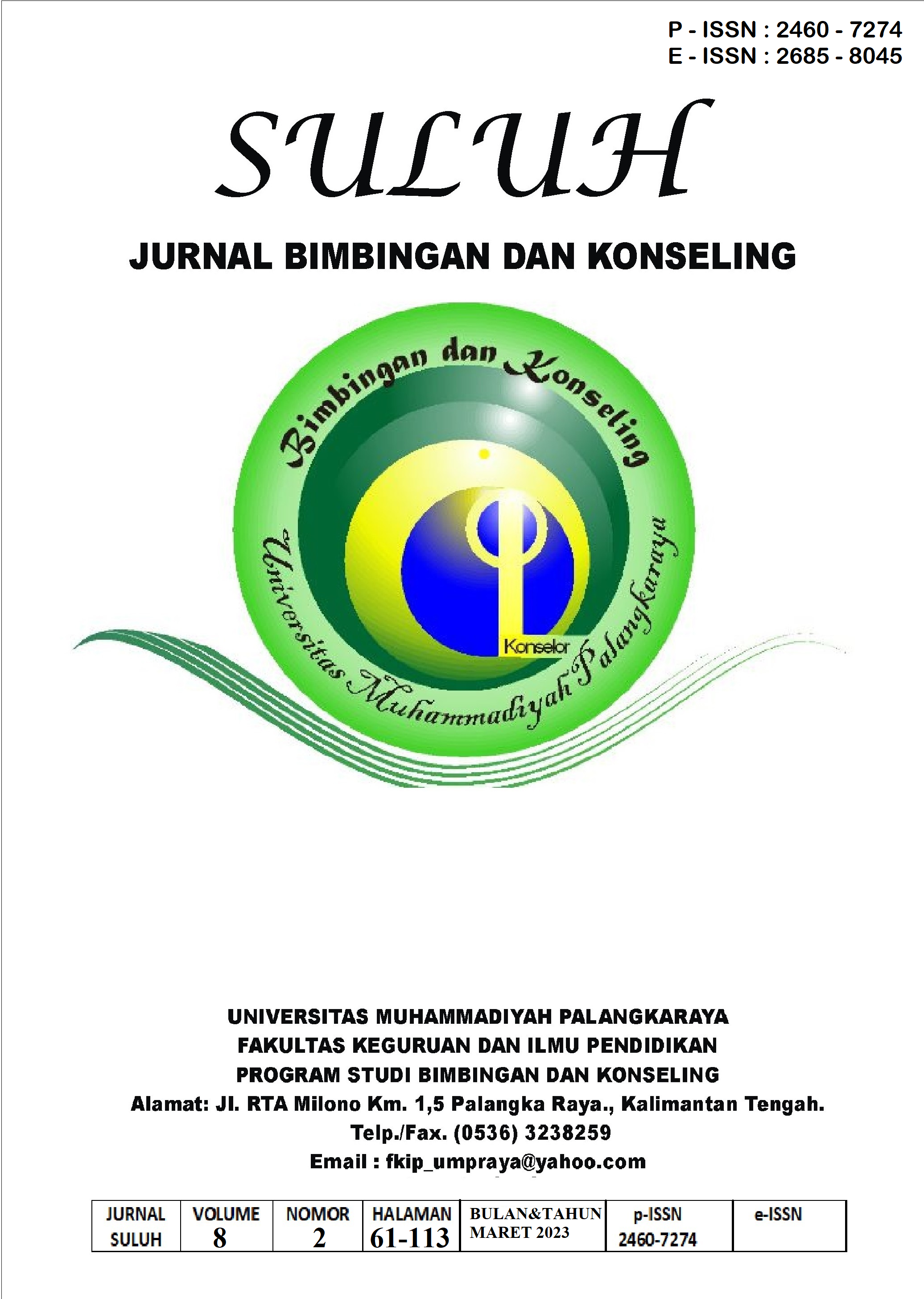Pendekatan Cognitive-Behavioral Therapy Dengan Teknik Thought Stopping Untuk Menangani Trauma Psikologis Mahasiswa Korban Pengkhianatan Cognitive-Behavioral Therapy Approach With Thought Stopping Technique To Handle Psychological Trauma in Student Victims of Betrayal
Main Article Content
Abstract
The purpose of this research is to determine the response of psychological trauma victims of betrayal using the cognitive-behavioral therapy method with thought stopping techniques. The subjects in this study are students from one of the universities in Palangka Raya city. The research procedure is by conducting interviews using the thought stopping approach, explaining their traumatic events, and presenting the results before and after the therapy is conducted. The result of this therapy shows that the respondents have not fully been able to change their behavior and social condition because they are still in the recovery stage from the trauma they experienced. However, from a cognitive perspective, the subjects are able to suppress their negative thoughts and try to sincerely accept the incident on themselves in their affective aspect.
Downloads
Article Details

This work is licensed under a Creative Commons Attribution-ShareAlike 4.0 International License.
All rights reserved. This publication may be reproduced, stored in a retrieval system, or transmitted in any form or by any means, electronic, mechanical, photocopying, recording.
References
Aryani Safithry, E., & Sari Dewi, I. (2020). Terapi menulis ekspresif untuk menurunkan tingkat stres akademik peserta didik di sekolah full day school. Suluh: Jurnal Bimbingan Dan Konseling, 5(2), 40–47. https://doi.org/10.33084/suluh.v5i1.1313
Beck, Judith S. (2011). Cognitive-behavior therapy: basic and beyond (2nd ed). New York: The Guilford Press.
Davision, G. C. (2006). Psikologi abnormal edisi ke-9. Jakarta: Raja Grafindo Persada
Gunarsa, S. D. (2007). Konseling dan psikoterapi. Jakarta: Gunung Mulia
Hendriani, W. (2018). Resiliensi psikologis: sebuah pengantar. Kencana Prenadamedia Group.
Hidayati, K. B. (2016). Konsep diri, adversity quotient dan penyesuaian diri pada remaja, Jurnal Psikologi Indonesia: Persona, Vol. 5, No. 2.
Hurlock, E. B. (1980). Psikologi perkembangan: suatu pendekatan sepanjang rentang kehidupan. Jakarta: Erlangga.
Munandar, H., Palangkaraya, M., & Raya, P. (2022). Studi fenomenologi subjective well-being pada pekerja perempuan Phenomenology study of subjective well-being on women workers. Jurnal Psikologi Dan Psikologi Islam, 19(1), 2655–5034. https://doi.org/10.18860/psi.v19i1.15297
Munandar, H., Herman, H., Putra, D. A., & Nilam, N. (2022). The relationship between positive thinking, social support, and students’ psychological well-being during online learning. Jurnal Psikologi Pendidikan Dan Konseling: Jurnal Kajian Psikologi Pendidikan Dan Bimbingan Konseling, 8(1), 7. https://doi.org/10.26858/jppk.v8i1.24274
Munandar, H., Situmorang, N. Z., & Tentama, F. (2015). Subjective well-being pada pekerja perempuan. Fakultas Psikologi Universitas Muhammadiyah Jember, 1–11.
Mutiara, W. (2008). Gambaran Perilaku Seksual dengan Orientasi Heteroseksual Mahasiswa Kos di Kecamatan Jatinagor, Jurnal Neliti, Vol. 10, No. 163.
Roberts, A. R., & J, G. (2009). Buku pintar pekerja sosial, jilid 2 (J. Damanik & C. Pattiasina (eds.). Gunung Mulia.
Siswoyo, D. (2012). Ilmu pendidikan. Yogyakarta: UNY Press.

